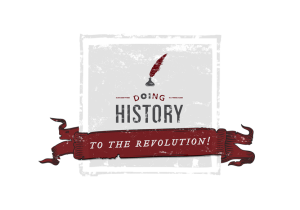What may have been at the heart of the sentiments I heard about how historians who work beyond the professoriate are better placed to know the publics they want to write for and reach comes down to the types of field work different historians perform.
What Comes Next? Thoughts On the Future of Historical Scholarship
I define a “native audio history” as a narrative work of scholarly history created and produced in audio. It is a work that considers and presents sounds that evoke the past as well as the sounds that produce history. When I hear this genre, I hear the archives and intellectual production of history as an integral part of the presentation. It’s a genre that answers the whys and hows of history.
Professional Website, v. 4.0
A tour of the fourth iteration of my professional website.
Welcome to my new website!
A website represents your home on the web. It’s where people come to learn more information about you and where you have the opportunity to convey the image and message you want to the world.
I really loved my old website, but I needed a change. It felt dated (it was three and half years old) and as the third iteration of my original website, it no longer conveyed the image and message I want to convey to the world.
Writing Early American History with Sound
 On April 18, 2017, a new preview episode of the Doing History: To the Revolution! series will post on Ben Franklin's World. It will be my most creative episode yet because it tells a story and uses sound to enhance the story I'm telling. The Omohundro Institute posted a piece I wrote about thinking through how to use sound to convey history on it's blog, Uncommon Sense.
I've been thinking a lot about horses. Specifically, what a Narragansett Pacer mare would have sounded like galloping on a dirt road in mid-April in the dead of night.[1]
On April 18, 2017, a new preview episode of the Doing History: To the Revolution! series will post on Ben Franklin's World. It will be my most creative episode yet because it tells a story and uses sound to enhance the story I'm telling. The Omohundro Institute posted a piece I wrote about thinking through how to use sound to convey history on it's blog, Uncommon Sense.
I've been thinking a lot about horses. Specifically, what a Narragansett Pacer mare would have sounded like galloping on a dirt road in mid-April in the dead of night.[1]
If I were a bystander, I might hear the faint noises of the labored breathing of the horse, the muffled commands of its rider, and a gallop that would all increase in volume until it peaked when I saw the horse and rider go by and heard its tack jingle. Then all of those sounds would fade into the distance as the horse made its way down the road.
If I were riding the horse, I'd hear the horse galloping on the dirt road differently. The horse's labored breathing, hoof beat, and tack jingle would be constant sounds in my ears. I'd also likely hear my clothes rustling in the wind created by our movement, if I listened to my experience fully.
The weather would also dictate the sounds I'd hear. Horses galloping on dry, dirt roads sound different than those galloping on wet, muddy roads. Plus, wind would make the dead of night seem alive. Instead of hearing the quiet stillness of the night, I'd hear the rustle of leaves and branches.
I've put a lot of thought into what will likely amount to about 10-20 seconds of audio in my next narrative-style podcast episode, "Paul Revere's Ride Through History," which will air as the next teaser episode of the Ben Franklin's World-Omohundro Institute's "Doing History: To the Revolution!" series on April 18, 2017.
How Do You Write a Book with 3 Hours Per Week?
 Last week I had the opportunity to spend some time at the Omohundro Institute. In between planning sessions for the new "Doing History: To the Revolution!" series, I caught up with friends and colleagues, some of whom asked me whether I had any time to pursue original research and whether I was still working towards a book.
I responded that "yes, I'm still working toward a book." Actually, I'm working toward two books. It seems the Articles of Confederation is a great topic to think through the same themes of identity, nation building, and conflict resolution that I worked on in my dissertation. My dissertation may, in fact, become a book after all.
Last week I had the opportunity to spend some time at the Omohundro Institute. In between planning sessions for the new "Doing History: To the Revolution!" series, I caught up with friends and colleagues, some of whom asked me whether I had any time to pursue original research and whether I was still working towards a book.
I responded that "yes, I'm still working toward a book." Actually, I'm working toward two books. It seems the Articles of Confederation is a great topic to think through the same themes of identity, nation building, and conflict resolution that I worked on in my dissertation. My dissertation may, in fact, become a book after all.
As I spoke with my colleagues about my projects and excitedly told them about my plans one stopped me and asked: "how do you plan to write a book with only 3 hours a week to work on it?"
The question is a good one and one I'm pondering. How do I plan to finish a book and write a second one when the only time I can set aside consistently to work on them is 3-4 hours on Sunday mornings?
In graduate school, I asked my professors about how they write and about their workflows; communications and optimized workflows are topics that interest me. All of them said they find 1-4 hours each day to write. I still ask these questions of colleagues and the most prolific of them give the same answer.
I don't have 1-4 hours each day to devote to my written scholarship. Most days I find it difficult to set aside the hour I need to practice yoga or run--activities I find necessary for stress relief and mental health. Plus, the fact that I write about history in three different mediums is problematic. Each medium has it's own voice and ends. When I'm writing in audio my brain works differently. It's hard to think about writing and editing long form text when I'm actively engaged in audio work. Plus the voice I use in my audio work is not the same voice I would use in long form text.
I may not have 1-4 hours per day, but I do have Sunday mornings. Most Sundays I can work for at least 3 hours before my family gets up and moving for the day and before I have to turn to the work that exceeds the bounds of a sane work week. I also have occasional snippets of time on non-audio days where I can draft short blog posts like this one.
Can I write a book by writing it as a series of blog posts?
Some fiction authors do this, they write their books in the form of serialized blog posts. You see this most commonly on the social networking site wattpad. But would this serialized-blog-post model work for a history book?
Blog posts and history books have different voices. Blog posts tend to have an informal tone that makes use of contractions, casual word choice, and the first person. I've yet to read a scholarly history book with the tone and voice of blog writing.
Blog posts are also public. Publishers want authors to reserve their best content for their books so they can give readers a great reason to purchase them. If I write my books adopting a blog workflow, I won’t be able to publish everything I write on my blog.
Blog posts and history books also serve different functions. Blog posts tend to be short, one-offs where writers present and work through an idea. History books usually present multiple, complex ideas by working through long, detailed stories and examples. The intellectual production that goes into a book is much different from the intellectual production that goes into a blog post.
To get back to my colleague's question, I don't know how I plan to write a book, or two books, with 3 hours per week to work on them. I don't know how to turn short-form thinking into long-form thinking just yet. Still, it seems like I will need to adopt and adapt the blog-post method of book writing to my practice of history if I intend to write books. And as much as I love new media, I love the old. I want to write books about the BIG histories I think about and I want to contribute to the historiography in a meaningful way. I also know that I have what it takes to be a good "book historian" and I want to prove it.
Some day I will finish my books and they will be the books I want to write and they will be books that contribute. I just have to figure out how to get them done. I will solve this problem. In the meantime, with the exception of feeling like I should have written a book by now, I have no regrets about taking the career path less traveled. I have the privilege of increasing awareness about history and the work historians do by connecting historians to a public who is both interested in and thirsty for their work. Every day I get to help demonstrate why history matters and showcase the value of historians' work to society. And I get to do it all by writing history in and for new media.



